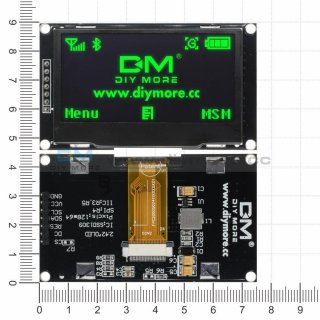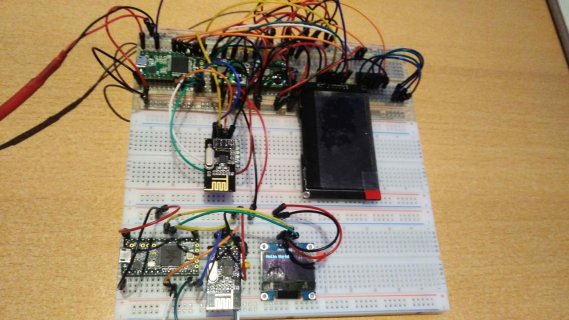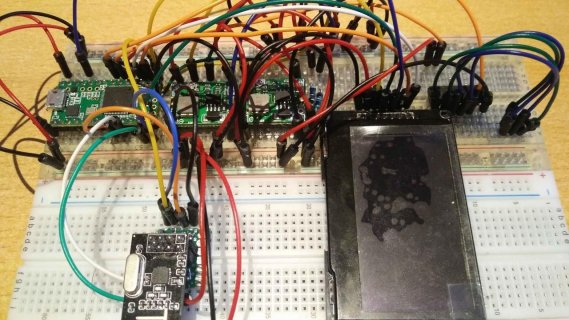C3D
Active member
Hello Forum,
Iam facing some problems with a Teensy 3.1 in combination with a "NRF24L01 2.4GHz - SPI Interface Wireless Transceiver" and an "SSD1306 OLED Display".
The display and the transceiver work both in SPI.
If i use the display only the display works.
If i add the transceiver the display stops displaying.
SCK,DIN,DOUT are shared, CS (SS) is seperate for each device.
Iam sure i have some wrong wiring going on maybe, but i cant figure out where the collision is happening.
If i pull out the Transceiver and unpower/repower the Teensy then the display shows something.
If i pull out the SCK from the Transceiver the display shows artefacts (a bar that gets longer with every received text from the sender. rhytmic)
The sender works fine (Teensy 3.2 and an I2C OLED, so no conflict there).
Iam facing some problems with a Teensy 3.1 in combination with a "NRF24L01 2.4GHz - SPI Interface Wireless Transceiver" and an "SSD1306 OLED Display".
The display and the transceiver work both in SPI.
If i use the display only the display works.
If i add the transceiver the display stops displaying.
SCK,DIN,DOUT are shared, CS (SS) is seperate for each device.
Iam sure i have some wrong wiring going on maybe, but i cant figure out where the collision is happening.
If i pull out the Transceiver and unpower/repower the Teensy then the display shows something.
If i pull out the SCK from the Transceiver the display shows artefacts (a bar that gets longer with every received text from the sender. rhytmic)
The sender works fine (Teensy 3.2 and an I2C OLED, so no conflict there).
Code:
// Receiver COM4
/*
SPI - Serial Peripheral Interface
NRF24L01 2.4GHz - SPI Interface Wireless Transceiver
_______________________________________________________________________________________________________________________________________________
Radio NRF24L01 Teensy 3.1 Description
_______________________________________________________________________________________________________________________________________________
VCC Power 3.3v red no SPI Pin
GND Ground 3.3v black no SPI Pin
CE Chip enable Pin 7 orange DOUT* CE : set high to recieve wireless data, low to send
CSN (SS) Chip select not Pin 8 white DIN* CSN : SPI enable pin, set low to listen to SPI bus.
SCK Serial Clock Pin 13 yellow SCK
MOSI MasterOUTSlaveIN Pin 11 green DOUT Data Output
MISO MasterINSlaveOUT Pin 12 blue DIN Data Input
IRQ Interrupt discon Active low pin, used only if interrupt is required
*/
/*
_______________________________________________________________________________________________________________________________________________
Display SSD1306 Teensy 3.1
_______________________________________________________________________________________________________________________________________________
GND Power 3.3v red no SPI Pin
VCC Ground 3.3v black no SPI Pin
RES Reset Pin 23 blue no SPI Pin
SDL (SCK) Serial Clock Pin 13 yellow SCK
SDA (MOSI) Serial Data (In) Pin 11 green DOUT
DC Data Command Pin 14 orange DIN
CS (SS) Chip select Pin 15 white CS
*/
// Display Setup
#include <SPI.h>
#include <RF24.h>
#include <Adafruit_GFX.h>
#include <Adafruit_SSD1306.h>
Adafruit_SSD1306 display(14, 23, 15); // DC,RESET,CS
RF24 radio(7, 8); // CE,CSN
const byte address[6] = "00001";
void setup() {
// Display Object
display.begin(SSD1306_SWITCHCAPVCC);
display.setRotation(3);
display.setTextSize(1);
display.setTextColor(WHITE, BLACK);
display.clearDisplay();
display.setCursor(0, 0);
display.println("Welcome!");
display.display();
radio.begin();
radio.setPALevel(RF24_PA_HIGH);
radio.openReadingPipe(1, address);
radio.startListening();
}
void loop() {
if (radio.available()) {
char text[32] = "";
radio.read(&text, sizeof(text));
display.clearDisplay();
display.display();
delay(20);
display.setCursor(0, 0);
display.println("Receiving:");
display.println(text);
display.display();
}
}



